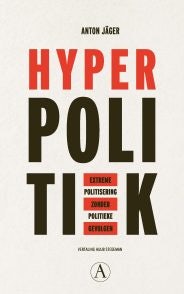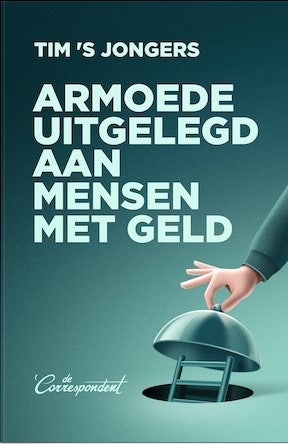Nonfiction
‘Hyperpolitics’ by Anton Jäger
Extreme politicization without political action

Anyone who has ever participated in heated discussions can confirm that politics has returned to everyday life and that debates about COVID-19, ‘wokeness’, and identity have long since spilled beyond the confines of X (Twitter). After an era of post-politics in which technocratic governance prevailed and citizens could at most comment from the sidelines, almost everything is now under political high tension. To describe this phenomenon, Anton Jäger coined the term ‘hyperpolitics’.
In ‘Hyperpolitics’, Anton Jäger travels through 150 years of democratic history to explain how current politics works and he comes up with a remarkable and illuminating explanation.
'Baltic Souls' by Jan Brokken
A masterful book about the cruelty of history and the irreparable rifts it creates in the lives of its victims

During a boat trip on the Baltic, Jan Brokken chanced upon Pärnu harbour, on the Estonian coast of the Gulf of Riga. It was an unforgettable introduction to the Baltic lands: Estonia, Latvia and Lithuania, and the Russian enclave of Kaliningrad. The extraordinary light, the tranquil landscape and the stories he heard there drew him back time and again.
In 'Baltic Souls', Brokken connects the cultural richness and social diversity of the region over the past eight centuries with tales of personal tragedy and a first-hand account of his travels. A remarkable number of talented people have come from this relatively small, sparsely populated area, many of them Jewish in origin. Brokken looks at twenty of those who have left their mark on art and culture worldwide, from filmmaker Sergei Eisenstein and philosopher Hannah Arendt in the early decades of the twentieth century to figures of our own time including violinist Gidon Kremer, composer Arvo Pärt and dancer Mikhail Baryshnikov.
‘Poverty Explained to People with Money’ by Tim ‘S Jongers
A crash course in poverty for the privileged

Most people with money barely scratch the surface of understanding poverty’s complexities. They moralize, oversimplify, and question why the poor make ‘bad’ decisions, all while assuming they would fare better in the same circumstances.
The chasm between those who craft poverty policies and those who are subjected to it harms both individuals and society as a whole. This book bridges the gap between academic analysis of poverty and the lived experience of those who have to face it.
Avoiding sensationalism and self-pity, the author uses parts of his own story of growing up in abject poverty as a tool to illustrate his analysis. Aimed at the privileged, this is a crash course in understanding poverty’s depths – a vital step towards meaningful change. Because fighting poverty begins with seeing it differently.
'The Life of Mice' by Eva Meijer
How living with rescue mice leads to a broader ethical enquiry into animal rights

In 2020, Eva Meijer started adopting laboratory mice from Utrecht University via a rodent rescue project. For three years, the writer took care of twenty-five mice at home while convalescing from Long Covid. Observing the way they clean each other, compulsively tidy up, run in the wheel, make escape attempts, and approach nest-building as a quasi-artform, Meijer came to know them as fully-fledged individuals with their own personalities. Soon Flankie, Bram, Wezel, Bullie and companions were making a deep impact on their human observer.
Many scientific articles have been written about lab mice, but they are rarely actually about the mice themselves. They describe what the research teaches us about human diseases, human emotions, human neurology and other human matters. Our propensity for anthropocentric thought places humans at the centre of society, marginalizing other creatures, organisms and things. Meijer argues, however that we need to move towards a different political system based on justice and freedom in order to co-exist with human and non-human beings.
'Bold Ventures' by Charlotte Van den Broeck
13 ways of looking at failure

In ‘Bold Ventures’ Charlotte Van den Broeck has gathered thirteen tales about tragic architects – tragic because these well-known or forgotten master-builders committed suicide in or on account of a building designed by them. Their intervention in the public arena culminated in a fiasco or they viewed it as such. Over the past few years, Charlotte Van den Broeck travelled extensively to find out more about these architects and their fate. A full Danish translation published by Jensen & Dalgaard is available.
This highly successful book, which was translated into several languages, including German, English, French, Spanish and Italian, also deserves a Swedish translation. Debuted as a poet, Charlotte Van den Broeck is a master of detailed observation with an original point of view to address her topics. As a young and innovative author she does not hesitate to mix objective facts with subjective thoughts. Her latest book, A Flame of Thylacines, on the Tasmanian tiger, is also proof of her unique approach.
'A History of the World in Twelve Beans' by Joël Broekaert
On the role of beans in human history: from revolutions to modern genetics

Beans have never been sexy. Throughout history, they’ve always been seen as a poor person’s alternative to meat. And yet beans, apart from being incredibly nutritious and good for soil, have played a fundamental role in the human story. Culinary journalist Joël Broekaert brings us a playful world history, as told through twelve beans – or rather, ten plus two which we often consider beans but aren’t really: coffee and cacao.
A grandiose story of humanity, as told through humble legumes: the story of humans and beans is one that touches every continent (except Antarctica). Beans are our past, present and above all, perhaps, beans are our future: in these times of climate crisis, legumes such as lupin beans hold the key to juicy meatalternatives and sustainable food systems.
'In the Footsteps of the Burgundians' by Bart Van Loo
Bringing the Late Middle Ages back to life

Following his bestseller The Burgundians, of which over 375,000 copies were sold across Europe, Bart Van Loo has written another fascinating journey about our distant past. In the final part of his diptych, the author brings the Late Middle Ages back to life in inimitable fashion.
Bart Van Loo is a Francophile who really masters the way to tell stories in an extraordinarily manner. In his books he bases himself on the most recent scientific research, but succeeds in making history, whether it is about the cultural remains of the Burgundian dukes or an historical figure as Napoleon, captivating and readable in texts that readers will devour.
'Burdened House' by Christien Brinkgreve
A bestselling memoir about the space one occupies in society as a woman

In 'Burdened House', Christien Brinkgreve offers a poignant account of a woman's journey following the loss of her husband. As she embarks on the daunting task of decluttering their home, each room becomes a portal to the past, unearthing memories and emotions long buried. Through this intimate process, she seeks to rediscover her late husband, understand their shared history, and reflect on the complexities of their life together. This memoir delves deep into the spaces we occupy—in our homes, relationships, and society—and examines themes of solitude, anxiety, and the profound choices we make out of love.
Christien Brinkgreve (1949) is a distinguished sociologist and author known for her insightful writings on gender dynamics, family structures, and societal changes. Revealing about the complexity of long-term heterosexual relationships, this is a brutally honest account that both stuns and moves the reader. More than 65,000 copies have already been sold in the Netherlands.